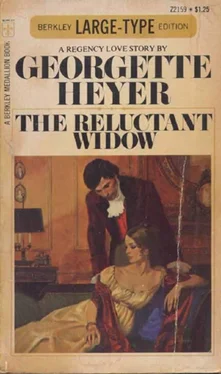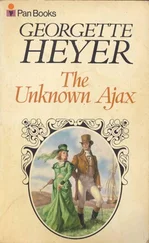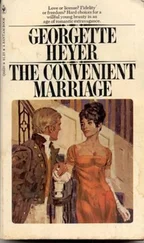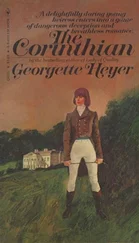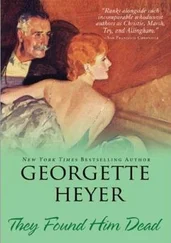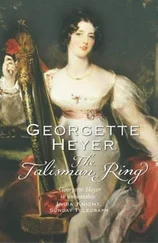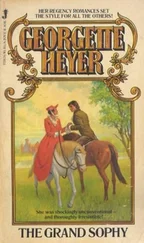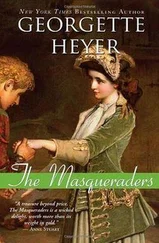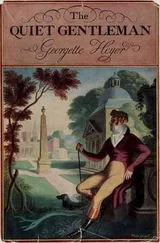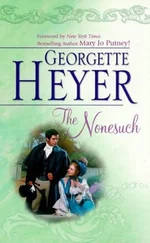Georgette Heyer
The Reluctant Widow
It was dusk when the London to Little Hampton stagecoach lurched into the village of Billingshurst, and a cold mist was beginning to creep knee-high over the dimly seen countryside. The coach drew up at an inn, and the steps were let down to enable a passenger to alight. A lady, soberly dressed in a drab-colored pelisse and a round bonnet without a feather, descended onto the road. While she waited for a corded trunk and a valise to be extricated from the boot, the coachman, finding himself to be some minutes ahead of his time sheet, hitched up his reins, clambered down from the box, and in defiance of the regulations governing the conduct of stage coachmen, rolled into the taproom in search of such stimulant as would enable him to accomplish the remainder of the journey without endangering an apparently enfeebled constitution.
The passenger, meanwhile, stood in the roadway with her trunk at her feet, and looked about her in a little uncertainty. She was expecting to be met, but as her experience had taught her that the gig was more commonly employed for the purpose of picking up the new governess than the carriage used by her employers, she hesitated to approach the only conveyance she could perceive, which was a light traveling coach, drawn up on the opposite side of the road. While she stood looking about her, however, a servant jumped down from the box and came up to her, touching his hat and inquiring whether she would be the young lady who had come down from London in answer to the advertisement. Upon her assenting, he made her a little bow, picked up the valise, and led the way across the road to the traveling coach. She stepped up into it, her spirits insensibly rising at this unlooked-for attention to her comfort, and was further gratified by the servant’s spreading a rug over her knees and expressing the hope that she would not feel chilled by the evening air. The steps were put up, the door shut, the trunk bestowed on the roof, and in a very few moments the coach moved forward, bowling along in a well-sprung manner that formed a pleasing contrast to the jolting the stagecoach passenger had been enduring for several hours.
She leaned back against the squabs with a sigh of relief. The stage had been crowded, and her journey an uncomfortable one. She wondered whether she would ever become accustomed to the disagreeable economies of poverty. Since she had had every opportunity of inuring herself to these over a period of six years, it seemed unlikely. Dispirited, but determined not to give way to melancholy reflections, she turned her thoughts away from the evils of her situation, and tried instead to speculate upon the probable character of her new post. It had been with no high hopes that she had set out from London earlier in the day. Her employer, seen once only in a quelling interview at Fenton’s Hotel, had disclosed no hint of the kindly impulse that must have caused her to send her own carriage to meet the governess. Miss Elinor Rochdale had been misled into thinking her massive bosom as hard as her rather prominent eyes, and, had any other choice offered, would have had no hesitation in declining a post in her household. But no other choice had offered. There were too often young gentlemen at a susceptible age in families requiring a governess, and Miss Rochdale was too young and too well favored to be eligible, in the eyes of most provident mammas, for the position. Happily, however—for Miss Rochdale’s savings were negligible, and her pride still too great to allow of her remaining longer as the guest of her own old governess—Mrs. Macclesfield’s only male offspring was a sturdy lad of seven. He was, by his mother’s account, high-spirited, and of so sensitive a temperament that the exercise of the greatest tact and persuasion was necessary to control his activities. Six years earlier Miss Rochdale would have shrunk from the horrors so clearly in store for her, but those years had taught her that the ideal situation was rarely to be found, and that where there was no spoiled child to make the governess’s life a burden, she would in all likelihood be expected to save her employer’s purse by performing the menial tasks generally allotted to the second housemaid.
Miss Rochdale tucked the rug more closely round her legs. A thick sheepskin mat upon the floor of the coach protected her feet from the draft, and she snuggled them into it gratefully, almost able to fancy herself once more Miss Rochdale of Feldenhall. traveling in her father’s carriage to an evening party. The style of servant who had been sent to fetch her, and the elegance of the equipage, had a little surprised her: she had not supposed Mrs. Macclesfield to have been in such comfortable circumstances. Upon first perceiving the coach, she had thought she had seen a crest upon the door panel, but in the failing light it was easy to be mistaken. She fell to pondering the probable degree of gentility of the establishment ahead of her and the various characters of its inmates, and since she was of a humorous turn of mind, soon lost herself in the weaving of several very improbable histories.
She was recalled to her surroundings by a perceptible slackening in the pace of the horses, and, looking out of the window, saw that the darkness had by this time closed in. The moon not having yet risen, it was impossible to discern anything of the country through which she was being driven, but she gained the impression of a narrow and certainly tortuous lane. She did not know for how long she had been in the coach, but it seemed a considerable time. She recollected that Mrs. Macclesfield had described her home at Five Mile Ash as being within a short distance of Billingshurst, and could only suppose that the way to it must be more than ordinarily circuitous. But as time went on it became apparent that either Mrs. Macclesfield’s notions of distance were country ones, or she had been deliberately mendacious.
The journey began to seem unending, but just as Miss Rochdale was entertaining a suspicion that the coachman had lost his way in the darkness the horses slowed from a jog trot to a walk, and the vehicle swung round at a sharp angle, its wheels encountering an uneven gravel surface; as of a carriage drive ill kept. The pace was picked up again and maintained for a few hundred yards. The coach then drew to a standstill and the groom once more jumped down from the box.
A faint silver light had begun to illumine the scene, and as she stepped out of the coach Miss Rochdale was just able to see that the house she was about to enter was of a respectable size, although built in a rambling and rather low-pitched style. Two sharp gables and some very tall chimney stacks were silhouetted against the night sky, and a lamp burning in one of the rooms showed that the windows were latticed.
The groom had tugged at the big iron bell some moments before, and the echoes of its distant clanging still sounded when the door was opened. An elderly man in shabby livery held it for Miss Rochdale to enter the house, favoring her, as she passed him, with an intent and rather anxious scrutiny. She scarcely heeded this, for her attention was claimed by her surroundings, which were surprising enough to cause her to check on the threshold, looking about her in a good deal of bewilderment. What, her startled brain demanded, had the woman she had seen at Fenton’s Hotel to do with all this decayed grandeur?
The hall in which she found herself was a large, irregularly shaped room, with a superb oaken stairway at one end of it, and at the other a huge stone fireplace, big enough for the roasting of an ox, thought Miss Rochdale, and with a chimney which might be depended on to gush forth smoke any time some unwise person kindled a fire on the flags beneath it. The plaster ceiling, blackened between the oak beams, showed how correct was Miss Rochdale’s prosaic reflection. The stairs and the floor of the hall were alike uncarpeted, and lacked polish; long brocade curtains, which had once been handsome but were now faded and in places worn threadbare, were drawn across the windows; a heavy gate-leg table in the center of the room bore, besides a film of dust, a riding whip, a glove, a crumpled newspaper, a tarnished brass bowl possibly intended to hold flowers, but just now full of odds and ends, two pewter mugs, and a snuff jar; a rusted suit of armor stood near the bottom of the staircase; there was a carved chest against one wall, with a welter of coats cast on the top of it; several chairs, one with a broken cane seat, and the others upholstered in rubbed leather, were scattered about; and on the walls were a number of pictures in heavy gilded frames, three moth-eaten foxes’ masks, two pairs of antlers, and a number of ancient horse pistols and fowling pieces.
Читать дальше
